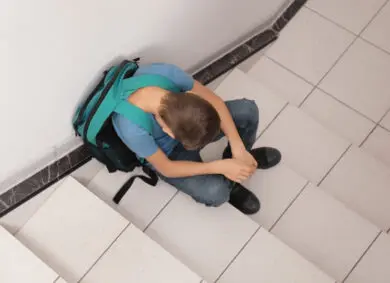For many parents, bullying brings up memories of witnessing or experiencing verbal or physical harm in the classroom or on the playground or school bus. Unfortunately, bullying is not just a thing of the past and is still very much a problem for today’s youth. And with the ubiquity of the internet and social media, kids face a whole new realm for bullying – one that makes it even easier to experience harassment and oftentimes suffer in silence.
The effects of bullying can go far beyond hurt feelings and result in long-lasting effects on the mental health of children and teens. If you’re concerned that your child is being bullied, there are ways you can recognize the signs and get help for your child.
Recognize the Signs of Bullying
It can be difficult for a child or teen to be open about their experiences being bullied. They may be concerned about being viewed as a tattle-tale or think that their parents or teachers won’t be able to help them.
However, there are signs you can look for if you suspect your child might be getting bullied.
- Difficulty sleeping. Difficulty falling or staying asleep, or tiredness in the morning could be a sign of bullying or depression. Your child may be too anxious to fall or stay asleep; they may be crying themselves to sleep or having nightmares. Wetting the bed is another sign of fear or anxiety in a child.
- Unexplained injuries. If you notice your child or teen coming home from school with bruises, scrapes, cuts, or torn clothes, and they’re nervous or avoid explaining what happened, they could be getting bullied. Try to assess if these are normal injuries as a result of play, or a sign of playground bullying and ask open-ended questions such as, “What happened at recess today?”
- Avoidance of social situations. If you notice your child has lost friends or developed a reluctance to spend time with them, this could be a sign of bullying. You may also notice your child is afraid to ride the bus or avoids school entirely by skipping classes or feigning an illness. If you’re beginning to notice a pattern, try talking to them about it. You can start by asking questions such as, “I’ve noticed you’re feeling sick a lot lately. Is everything okay at school?”
- Changes in eating habits. If you notice your child or teen’s eating habits are changing, such as skipping meals or binge eating, this could be a sign they’re experiencing emotional distress. For example, if your child comes home from school hungry, it could be because they didn’t eat lunch. They could be too nervous during lunchtime to eat, getting their lunch or lunch money stolen, or avoiding the cafeteria entirely because of bullying or harassment.
- Changes in social media behaviors. When a child is being bullied online, they may start spending too much time on their devices or avoiding them entirely. Monitor their social media sites by friending or following them, and if you suspect bullying, check their phone for harassing messages. You may also want to look into parental control and monitoring apps.
How to Help Your Child or Teen
Realizing that your child is being bullied can be a scary and overwhelming experience, and often one that leaves you feeling helpless. After all, you can’t be with them every second of the day or control the behavior of others. But, there are ways that you can support your child, as well as empower them to stand up for themselves and others who are being bullied.
Honest and open conversations with your child or teen will be critical in supporting them. Creating a safe and open space for your child or teen to talk will help you understand what’s going on and determine the appropriate path forward.
- Teach kids to treat everyone with respect. Make sure your kids know it’s never okay to be mean or make fun of someone. Even a comment made in passing or as a joke can be hurtful, so help your child or teen understand the power of their words. And be sure that you’re modeling this behavior for them.
- Help protect them from cyberbullying. Online bullying can be particularly insidious and difficult for children to avoid. Help your children navigate the internet safely and monitor their online activity so you can spot any bullying early on.
- Encourage them to stand up for themselves and others. It can be scary for children or teens to advocate for themselves and go against what their peers are doing, but sometimes, a calm, respectful, and confident demeanor can nip bullying in the bud. And if they’re witnessing others being bullied, encourage them to speak up by telling a parent or teacher and showing kindness and friendship to the child being bullied.
Professional Support Can Help
Helping your child or teen through a bullying experience can be overwhelming, and the time may come when you need support. A trained counselor could help your child or teen develop tools and mechanisms to mitigate the effects of bullying and provide them with a safe space to talk it all through.
Know that you and your child or teen not alone if you’re dealing with bullying. Here at Sunstone, we have a group of counselors dedicated to supporting children and adolescents navigate the challenges of growing up. Reach out to us to find the right counselor for your loved ones.






